|
|
|
Sort Order |
|
|
|
Items / Page
|
|
|
|
|
|
|
| Srl | Item |
| 1 |
ID:
174334
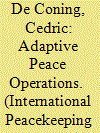

|
|
|
|
|
| Summary/Abstract |
Complexity theory offers a theoretical framework for analysing how social systems prevent, manage and recover from violent conflict. Insights from complexity suggest that for a peace process to become self-sustainable, resilient social institutions need to emerge from within, i.e. from the culture, history and socio-economic context of the relevant society. Peace operations are deployed to contain violence and to facilitate this process, but if they interfere too much, they will cause harm by inadvertently disrupting the very feedback loops critical for self-organization to emerge and to be sustained. To navigate this dilemma, the paper proposes employing an adaptive approach, where peace operations, together with the communities and people affected by the conflict, actively engage in an iterative process of inductive learning and adaptation. Adaptive Peace Operations is a normative and functional approach to peace operations that is aimed at navigating the complexity inherent in trying to nudge societal change processes towards sustaining peace, without causing harm.
|
|
|
|
|
|
|
|
|
|
|
|
|
|
|
|
| 2 |
ID:
174329


|
|
|
|
|
| Summary/Abstract |
After a decade of remarkable growth in the early 2000s, UN peacekeeping has entered a period of sharp contraction. This trend has been especially severe for civilian peacekeepers, who play vital though often neglected roles in UN operations: the number of civilian peacekeeper positions has shrunk by 37% since 2010. This article draws on 164 research interviews and the vast Business literature on downsizing to explore the effects of this contraction of the UN’s remaining civilian peacekeepers and the missions that employ them. To conceptualize this impact, the article begins by outlining the contributions a range of civilians – international and national staff, UN Volunteers and contractors – make to UN peacekeeping. Mobilizing insights from Business scholars, it then argues that difficult downsizing processes, high employee commitment, and workforce stratification place UN missions at high risk of ‘downsizing survivor syndrome’: sustained organizational productivity losses due to decreased individual performance and team coherence. The article then confirms empirically that the nature of UN peacekeeping downsizing, job insecurity, and competition among personnel categories pose profound risks to civilian peacekeeper performance and therefore challenge effective mandate implementation. It also highlights that decreased inter-mission mobility due to the contraction of UN peacekeeping overall exacerbates this effect.
|
|
|
|
|
|
|
|
|
|
|
|
|
|
|
|
| 3 |
ID:
174333
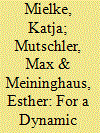

|
|
|
|
|
| Summary/Abstract |
Stabilization is a contestable concept of intervention in violent conflicts. Often, it is either uncritically supported or rejected. In this article, we criticize current conceptualisations and practices of stabilization and newly introduce a dynamic approach for stabilization that yields a transformative potential. By distinguishing static vs. dynamic approaches to stabilization, we address the widespread dilemma that so-called stabilization measures seem unable to avoid instability and protracted violence in the long-term. Our analysis of the three policy fields peacekeeping, train & equip programmes and migration management in Mali reveals the dominance of static elements in stabilization practice. Instead, our article proposes to see a transformative variant of stabilization measures that enhances long-term security and development. We argue that there are two dynamic approaches of stabilization that policy-makers and practitioners can apply in (post-)conflict societies: state-centred liberal peacebuilding that takes its normative core seriously, and non-state centric peacebuilding that acknowledges alternative lived orders.
|
|
|
|
|
|
|
|
|
|
|
|
|
|
|
|
| 4 |
ID:
174332
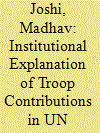

|
|
|
|
|
| Summary/Abstract |
What makes a UN member state contribute more peacekeepers to be deployed in hostile environments and place their troops at risk? A significant amount of scholarly research explores the need for, and effectiveness of, UN peacekeeping in conflict zones around the world. Few studies examine the factors that determine the size of peacekeeping contributions, and these studies do not focus on the role of neoliberal institutions. This study examines the relationship between the degree of linkages in neoliberal institutions and the size of peacekeeping contributions. I argue that the degree of linkages in neoliberal international institutions creates structural conditions that facilitate the information gathering process on the preferences and needs of UN member states and incentivize these states to contribute more peacekeeping troops. In my analysis of UN peacekeeping troop contributions data for all countries between 1990 and 2015, I find that the degree of neoliberal institutional linkages is the most consistent predictor of a UN member state’s size of peacekeeping contributions.
|
|
|
|
|
|
|
|
|
|
|
|
|
|
|
|
| 5 |
ID:
174331
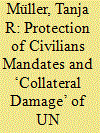

|
|
|
|
|
| Summary/Abstract |
This article contributes to refining our understanding of how a robust Protection of Civilians mandate in peacekeeping missions may have unintended and harmful consequences for key local actors involved. It focuses specifically on local mission staff employed to collect vital data on human rights abuses, taking the example of the hybrid UN-African Union (AU) peacekeeping mission in Darfur, UNAMID. It further explores how the UN system lacks a clear policy or automatically built-in mechanisms to prevent potential harm to those on whose local knowledge it relies. While predominately based on interview data with a small number of former UNAMID frontline human rights data-collectors from Darfur, the dynamics unveiled speak to more general issues when interrogating protection of civilians as the central pillar of UN peacekeeping missions, also beyond scenarios where the government of a host-state is hostile to the mission. The article concludes that the protection of local staff should feature prominently in any mission’s approach, including an active commitment to withdraw staff from their positions if their security is threatened or compromised.
|
|
|
|
|
|
|
|
|
|
|
|
|
|
|
|
| 6 |
ID:
174330
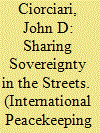

|
|
|
|
|
| Summary/Abstract |
Bolstering basic law enforcement is a major aim of most contemporary peacekeeping missions. In some cases, when local police forces have failed, governments have allowed international personnel to step into the breach and share law enforcement authority with the state. These ‘sovereignty-sharing’ ventures have had two prime mandates – to provide effective stopgap security and strengthen domestic police institutions. This article argues that external actors sometimes have provided useful emergency services, largely through paramilitary policing, but have struggled greatly to model effective general law enforcement and embed durable domestic reforms. A major reason is that most joint policing ventures have been built on precarious political foundations. Although national and international interests sometimes have converged amid security crises, the partners’ commitments generally have waned or diverged regarding ordinary community policing and institutional reform. This has contributed to ambiguous agreements and undermined cooperation in the field, as well as efforts to embed sustainable domestic reform.
|
|
|
|
|
|
|
|
|
|
|
|
|
|
|
|
|
|
|
|
|